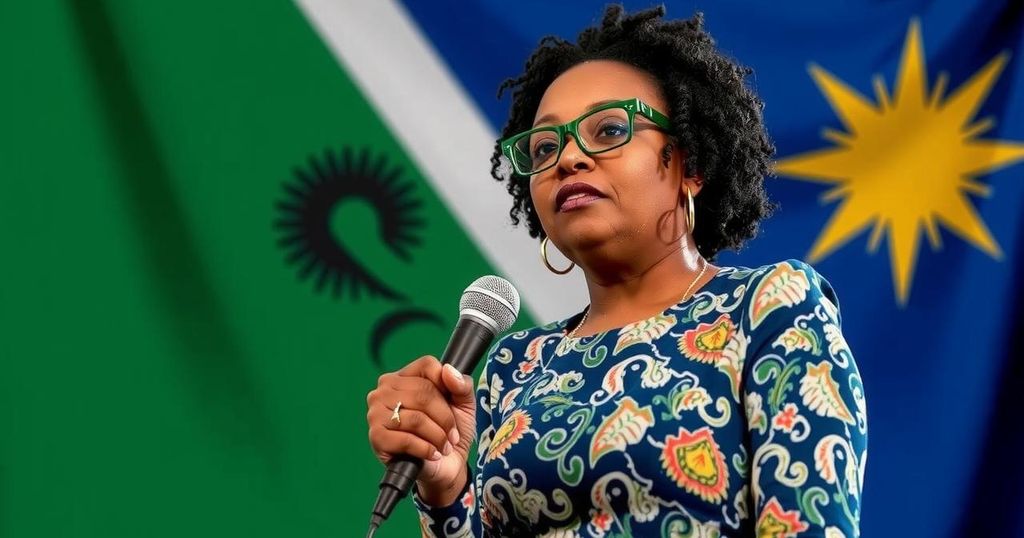Namibia has elected its first female president, Netumbo Nandi-Ndaitwah, winning 57% of the votes in a disputed election that continues the ruling Swapo party’s 34-year reign. Despite her victory, opposition parties are challenging the results citing legal issues. With a decline in parliamentary support for Swapo, Nandi-Ndaitwah’s leadership comes during a pivotal moment for the country.
Namibia has marked a historic milestone by electing its first female president, Netumbo Nandi-Ndaitwah, following a contentious election held last week. Nandi-Ndaitwah, the incumbent vice-president, secured victory with 57% of the votes, defying expectations of a potential runoff. Her election continues the ruling Swapo party’s dominance, which has been in power since the nation’s independence in 1990, following the end of apartheid in South Africa.
In her victory address, Nandi-Ndaitwah, age 72, declared, “The Namibian nation has voted for peace and stability” after the official results were disclosed on Tuesday evening. Her extensive political background includes involvement in Namibia’s independence movement in the 1970s, and she had served as the foreign minister before being promoted to vice-president earlier this year following the death of President Hage Geingob.
Despite her achievement, the electoral process has been marred by allegations of misconduct and technical difficulties, leading opposition parties to contest the validity of the results. Incidents such as ballot paper shortages prompted an extension of the voting period, which opposition leaders assert was not lawful. Leading the contest against Nandi-Ndaitwah was Panduleni Itula, who garnered 25.5% of the vote, a decrease from the 29% he received in 2019, representing the Independent Patriots for Change (IPC).
Nandi-Ndaitwah’s performance surpassed that of the ruling Swapo party, which obtained only 53% of parliamentary seats, a significant decline from 65% in the last elections. Interestingly, her election contrasts with a broader trend in southern Africa, where liberation movements have faced mounting opposition from younger voters dissatisfied with political leadership, as evidenced by electoral shifts in neighboring countries like South Africa, Botswana, and Mozambique.
The recent presidential election in Namibia is notable not only for the election of the first female president but also for the context in which it occurred. Swapo, the ruling party since Namibia’s independence in 1990, has been facing increasing challenges reflecting discontent among the electorate. This election follows a troubling trend seen throughout southern Africa where many liberation movements are losing support amid calls for reform and accountability. Nandi-Ndaitwah’s ascension comes during a critical juncture for Swapo as it navigates through political difficulties and public scrutiny regarding governance and corruption.
The election of Netumbo Nandi-Ndaitwah as Namibia’s first female president represents a significant moment in the nation’s history, showcasing a commitment to continuity amidst political strife. However, the controversies surrounding the electoral process indicate a potential shift in political dynamics, with opposition parties prepared to contest the results. As Nandi-Ndaitwah assumes leadership, her ability to foster stability and address public grievances will be critical not only for her administration but for the Swapo party’s future.
Original Source: www.theguardian.com







